| Srl | Item |
| 1 |
ID:
149247


|
|
|
|
|
| Summary/Abstract |
On 2 November 2014 George Osborne stood in the impressive great council chamber of Manchester town hall and, flanked by the ten leaders of Greater Manchester's local authorities, announced a devolution deal for the city-region. Greater Manchester would receive a significant package of powers over transport, housing, planning, skills, business support and welfare in exchange for creating new governance structures, including a directly elected mayor for the city-region. This article explores the background to the Devo Manc deal, arguing that it is the product of both a long history of local government collaboration in Greater Manchester and George Osborne's desire for a sweeping restructure of English governance. It traces how the key decisions were taken quickly and by a small number of key officials. The article also identifies some flaws in Devo Manc and considers whether it is an appropriate model for other city-regions in the UK.
|
|
|
|
|
|
|
|
|
|
|
|
|
|
|
|
| 2 |
ID:
149232
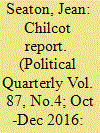

|
|
|
| 3 |
ID:
149233
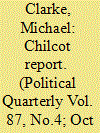

|
|
|
| 4 |
ID:
149234
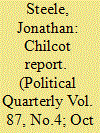

|
|
|
| 5 |
ID:
149235
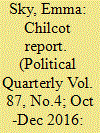

|
|
|
| 6 |
ID:
149236
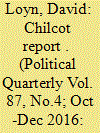

|
|
|
| 7 |
ID:
149237
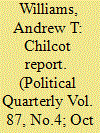

|
|
|
| 8 |
ID:
149238
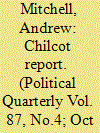

|
|
|
| 9 |
ID:
149239
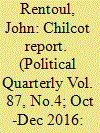

|
|
|
| 10 |
ID:
149248
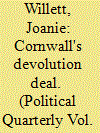

|
|
|
|
|
| Summary/Abstract |
This article considers the devolution deal signed by Cornwall and the Isles of Scilly in the summer of 2015. It asks if the deal constitutes a more sustainable approach to governance, concluding that while there are some factors that help to enhance sustainability, other areas urgently require more attention. These claims are made through an analysis of a model of sustainability which emphasises the importance of networks and feedback loops envisaging civil society as an adaptive organism. This helps to show that although power is significantly dispersed in some aspects of the ‘Cornwall Deal’, this latter does little to alter the highly centralised nature of governance across England, or provide spaces where local actors can feed back into central policy.
|
|
|
|
|
|
|
|
|
|
|
|
|
|
|
|
| 11 |
ID:
149242


|
|
|
|
|
| Summary/Abstract |
Northern Ireland and Scotland could and should stay within the European Union while remaining inside the United Kingdom. This proposal need not prevent, and may facilitate, England and Wales in leaving the EU, and it is in accordance with the respective preferences of the peoples of the two Unions who voted in the advisory referendum held on 23 June 2016. Prime Minister May and her Cabinet should address carefully the question of whether to trigger Article 50, or instead to give notice that only parts of the UK—England and Wales—will be leaving the EU. The price of enforcing the entirety of the UK's exit from the EU may be lasting damage to the two Unions that make up the United Kingdom of Great Britain and Northern Ireland.
|
|
|
|
|
|
|
|
|
|
|
|
|
|
|
|
| 12 |
ID:
149246
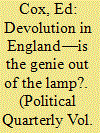

|
|
|
|
|
| Summary/Abstract |
This article explores the extent to which devolution within England can address the general malaise that is often described as ‘the English Question’. It considers how far the devolution genie might be considered out of the lamp. It takes as its basis three broad arguments for devolution—an economic case, a case concerning public service reform and a democratic argument for the decentralisation of power—and for each of these three it explores the theoretical underpinnings for the argument, how things are currently playing out in the current political context and what we might expect to see in the future. The article concludes with some suggestions as to how debates about the English Question might play out in the years ahead.
|
|
|
|
|
|
|
|
|
|
|
|
|
|
|
|
| 13 |
ID:
149245


|
|
|
|
|
| Summary/Abstract |
The Cities and Local Government Devolution Bill 2015–2016[HL] was introduced into the House of Lords as Bill No. 1 in the 2015–2016 parliamentary session. The Bill forms a critical element of the government's high-profile policy of devolving powers and responsibilities to local areas within England. The transition from first-generation ‘city deals’ to second-generation ‘devolution deals’ within five years provides a sense of the pace and development of the reform agenda but there is also a strong sense that something is missing. ‘Missing’ in the sense of an understanding of the specific type of devolution on offer, ‘missing’ in the sense of how an explosion of bilateral new ‘deals’ will be offset against the obvious risks of fragmentation and complexity, and ‘missing’—most importantly—in relation to the democratic roots that might be put in place to counterbalance the economic thrust and make the reform agenda sustainable. It is in exactly this context that this article argues that the full potential of the current devolution agenda will only be realised when the Conservative government fulfils its September 2014 commitment to wider civic engagement about how England is governed.
|
|
|
|
|
|
|
|
|
|
|
|
|
|
|
|
| 14 |
ID:
149241


|
|
|
|
|
| Summary/Abstract |
When Theresa May became Prime Minister in July 2016, she joined a list of eleven previous UK takeover leaders in the past 100 years. While the popular image is of Prime Ministers arriving in power after a general election victory, more than half of the Prime Ministers who governed since 1916 have acceded as ‘takeover leaders’ through an internal party process. This article analyses how such takeover leaders perform, concluding that May is likely to face greater obstacles and enjoy fewer advantages than if she had been popularly elected. Takeover leaders have less time in power and less chance of winning subsequent elections, and are generally rated as worse-performing.
|
|
|
|
|
|
|
|
|
|
|
|
|
|
|
|
| 15 |
ID:
149240


|
|
|
|
|
| Summary/Abstract |
The distribution of voting rights in the UK is an artefact of history rather than a product of clear legal or philosophical principles. Consequently, some resident aliens (i.e. immigrants) have the right to vote in all UK elections; others can vote in local elections but are excluded from national elections; still others are excluded from all elections. In England and Wales alone, roughly 2.3 million immigrants are excluded from voting in national elections. This exclusion is inconsistent with the founding principle of democracy and distorts political discourse. What if all immigrants could vote in national elections? We estimate that up to ninety-five parliamentary seats could have been won by a different party in the 2015 general election. More substantially, enfranchising all immigrants would require re-drawing UK constituency boundaries. The new electoral map would increase the relative power of urban constituencies and would incentivise some political entrepreneurs and parties to temper anti-immigration rhetoric.
|
|
|
|
|
|
|
|
|
|
|
|
|
|
|
|
| 16 |
ID:
149244
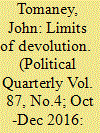

|
|
|
|
|
| Summary/Abstract |
This article challenges the narrowly founded but untroubled consensus about the alleged benefits of the Conservative government's devolution programme. It suggests that too much attention has been paid to purported benefits and too little regard to the potential risks, and draws attention to international evidence that suggests that the distribution of the benefits of devolution is crucially dependent on its design. It critically examines the case for the currently offered model of devolution and finds the underpinning economic model and limited forms of democratic accountability are likely to produce regressive social outcomes and the reinforcement of existing local elites. It calls for a wider public debate and fuller democratic scrutiny of the model of devolution on offer.
|
|
|
|
|
|
|
|
|
|
|
|
|
|
|
|
| 17 |
ID:
149250
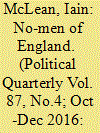

|
|
|
|
|
| Summary/Abstract |
Scotland and Wales was a principal policy of the Labour governments in office from 1974 to 1979, it was defeated in a guillotine vote in 1977. That defeat was orchestrated by the leaders of Tyne & Wear County Council, angry that a government of their own party was apparently neglecting their region in favour of Scotland. The project was rescued in two separate bills, but a further rebel amendment inserted a minimum assent condition in the required referendums. The people of Wales rejected the devolution they were offered. The people of Scotland accepted it, but by a margin that failed to cross the threshold. The resulting vote of confidence brought down the Labour government in March 1979. The role of Tyne & Wear County Council in killing the first bill has never been fully acknowledged. The lessons of the story for current devolution policy are explored. If the UK remains a single country, any policy for tax transfers must be fair to the English as well as to the people of the other three territories.
|
|
|
|
|
|
|
|
|
|
|
|
|
|
|
|
| 18 |
ID:
149243


|
|
|
|
|
| Summary/Abstract |
Party political interest in the so-called ‘English Question’ has grown in recent years, due to the enmeshing of constitutional issues with a growing political and public affiliation with and expression of English national identity and culture. More recently, attention has shifted to the decentralisation of government within England. The ‘English Question’ is thus defined by two interconnected but distinctive ‘English Questions’. This article will assess whether, in seeking to find answers for these ‘English Questions’, the Conservatives and Labour are establishing a more distinctive ‘politics of England’. It will first consider the extent to which the politicisation of English identity and civic society have stimulated a more nationally framed political culture and party politics, and then assess whether constitutional reforms undertaken in Westminster, especially the introduction of EVEL, and regional devolution initiatives within England might facilitate greater party political engagement with an emergent ‘politics of England’.
|
|
|
|
|
|
|
|
|
|
|
|
|
|
|
|
| 19 |
ID:
149249
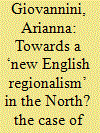

|
|
|
|
|
| Summary/Abstract |
Traditionally, the debate over English devolution has been framed by mainstream parties, favouring a top-down approach. However, this scenario has recently started to change, particularly in the areas with stronger regional identities such as the North of England. In 2014, the first regionalist party (Yorkshire First) was created, followed by the North East Party and the Northern Party. Such actors overtly challenge the narratives of regionalisation that have prevailed so far, and endorse bottom-up regionalism. This article offers the first analysis of these ‘new regional voices’ in the North, and seeks to assess emerging tensions between regionalisation and regionalism in the devolution debate. To achieve this, it concentrates on the case of Yorkshire First, drawing on documentary analysis and the results of a membership survey. It will be argued that, although still limited in its impact, the rise of Yorkshire First signals the presence of a political vacuum in the region which has been left open by mainstream politics, and that regional identity and territorial cleavages do matter in the current debate on devolution in the North of England.
|
|
|
|
|
|
|
|
|
|
|
|
|
|
|
|
| 20 |
ID:
149231


|
|
|